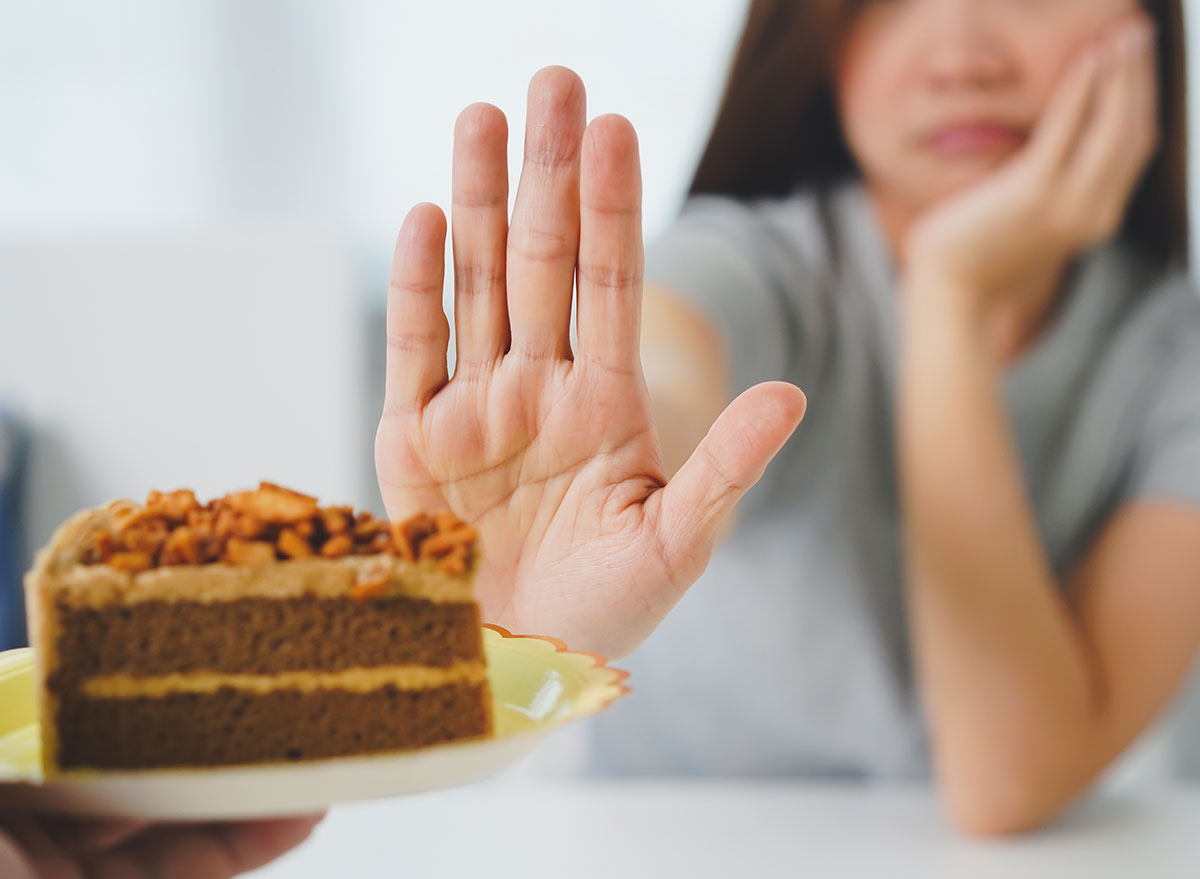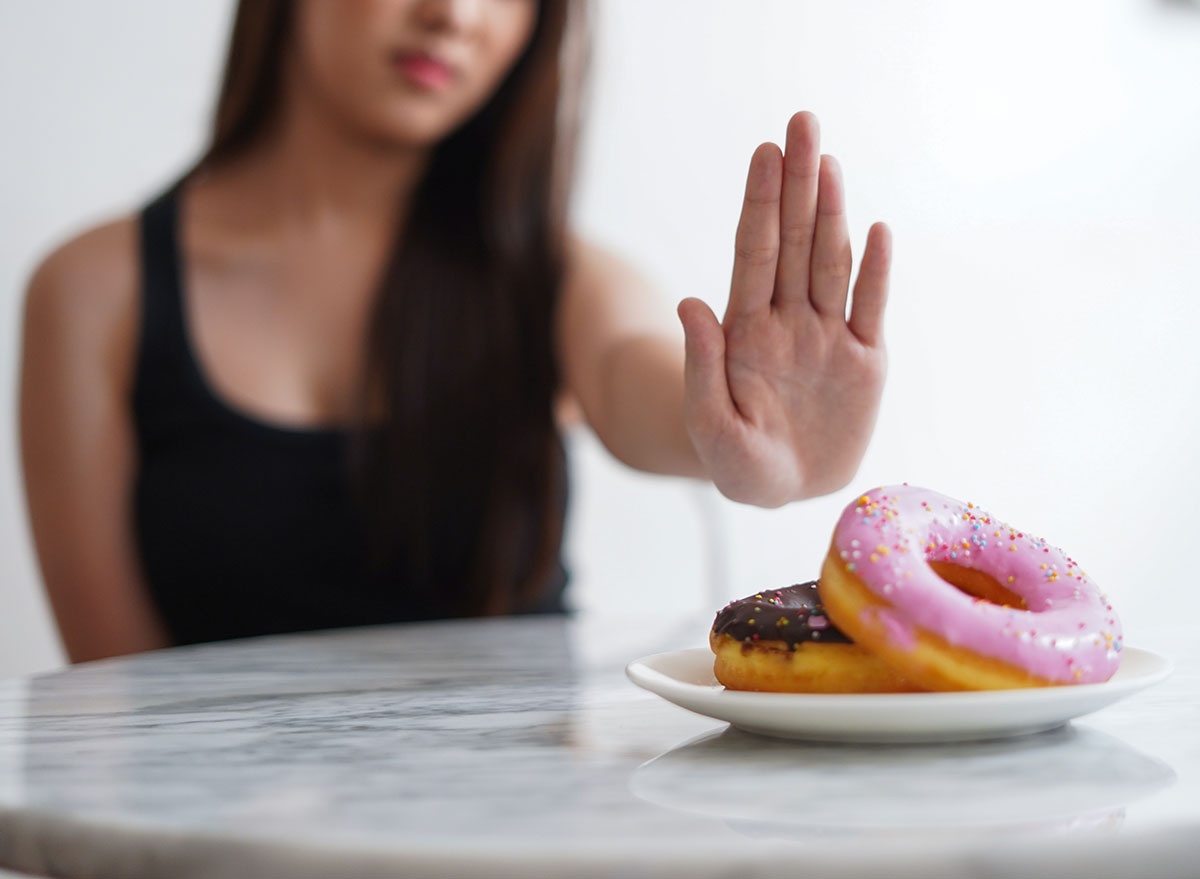One Major Side Effect of Giving Up Dessert, Says Science

If a slice of apple pie with vanilla ice cream on top makes you smile now but leaves you feeling guilty an hour later, you’ll want to know about one major side effect of giving up that dessert: Happiness.
That’s right. Just saying “no” to dessert can ultimately make you smile, suggest the results of three clinical experiments exploring self-control and life satisfaction published in the Journal of Personality.
While the experiments had nothing to do with ditching dessert, they did show how exercising self-control boosts feelings of wellness and contributes directly to happiness through avoiding and dealing with motivational conflict.
Self-control is often “associated with drudgery and self-denial rather than with pleasure and joy,” say the researchers from the universities of Chicago, Minnesota, and Illinois. But their findings demonstrate that people with greater ability to avoid temptation feel happier and gladder about their lives.
The key seems to be in avoiding frequent decisions, what they call “vice-virtue conflicts,” such as, say deciding whether to have dessert or third glass of wine. Avoiding the daily decision by adopting a “no-dessert” policy eliminates the emotional stress of vice-or-virtue choosing and provides a self-esteem lift, researchers say. (Related: Dangerous Side Effects of Drinking Too Much Wine, Says Science.)
How giving up dessert can have some great side effects.
The psychological boost you may gain by making a habit of avoiding dessert can promote other benefits, both mental and physical. Here are a few:
You’ll release feel-good chemicals.

Do you know that warm feeling you get when you volunteer or the sense of satisfaction you feel when you cross something off your to-do list? You can recreate it by making a commitment to give up dessert. Scientific research suggests that it’s possible to spike your endorphins and release feel-good neurotransmitters like dopamine simply by setting and accomplishing small goals like this.
You’ll probably lose weight.

As you know, reducing calories is the key to losing weight. The easiest way to accomplish that is to target the biggest contributors of calories in your diet, namely sugar-sweetened beverages and, you guessed it, dessert! Think about a visit to a restaurant like Cracker Barrel. After dinner, don’t order a dessert, say for example their peach cobbler with one scoop of ice cream, and you’ve just cut 490 calories, 20 grams of saturated fat, and 49 grams of sugar from your day’s diet. Make a habit of giving up high-calorie desserts and you’re on your way to significant calorie savings. Read more: The Unhealthiest Restaurant Desserts.
You’ll maintain your muscle.

As we age, we lose muscle mass, especially if we don’t do resistance training regularly. Age-related muscle loss is called sarcopenia, and eating lots of sugar accelerates that muscle wasting, suggest studies, including a 2015 animal study in The Journal of Nutrition, which found that sucrose-fed rats lost more muscle and added more fat than starch-fed rats. Apparently, high sugar intake inhibits protein synthesis that builds muscle. By cutting out dessert, you may hold on to more muscle as you get older.
You’ll prevent fat from cozying up to your heart.

When you eliminate dessert after meals, you are significantly reducing the number of added sugars you consume in a day. That means you can eat a greater quantity of healthful food in a sitting than you would if you had saved room for dessert. And that’s good news for your heart. A long-term study of more than 3,000 healthy participants measured food and beverage consumption over a 20-year period against CT scans of the chest and abdomen of those people to analyze the association between sugar consumption and body fat. The findings, reported in the European Journal of Preventive Cardiology, demonstrated that the highest intakes of sugary beverages and processed foods with added sugars were related to fat storage around the vital organs, including the heart. “We know that fat deposits are connected with higher risks of heart disease and diabetes,” said study co-author Lyn Steffen, an associate professor of epidemiology at the University of Minnesota. So, ditching dessert will likely reduce your chances of developing obesity and type 2 diabetes, too.
You’ll be sharper and remember more.

A high-sugar dessert may make you forget what you had for dinner. But dump dessert and, over time, you may do your brain a big favor. An animal study done by University of California Los Angeles researchers found that a steady diet of high fructose corn syrup, a sweet ingredient in a lot of premade desserts like cake, cookies, and other baked goods, slows the brain and hampers both memory and learning.
You may look younger.

Another benefit of reducing your risk of diabetes by eliminating sugary desserts is avoiding prematurely aging skin. People with high blood sugar levels (a symptom of diabetes) are at greater risk of producing advanced glycation end products or AGEs, which are inflammation-promoting compounds that are formed when protein or fat combine with sugars like glucose and fructose in the bloodstream. This process, called glycation, “results in characteristic structural, morphological, and functional changes in the skin…known as ‘sugar sag,'” say dermatology researchers from Baylor College of Medicine in a report in Skin Therapy Letter.
You’ll enjoy more restful sleep.

A sugary dessert may make you sleepy after dinner but keep you up at night. By eliminating the high saturated fats and sugars typical of most decadent desserts, you may ensure a more restful slumber, according to a clinical trial reported in the Journal of Clinical Sleep Medicine. The small study involved 26 normal weight adults who ate different diets during different days and had their sleep duration and quality analyzed. The researchers found that low fiber and high saturated fat and sugar intake (which is characteristic of dessert foods) was associated with less restorative sleep and more arousals during the night.
Read this next:








